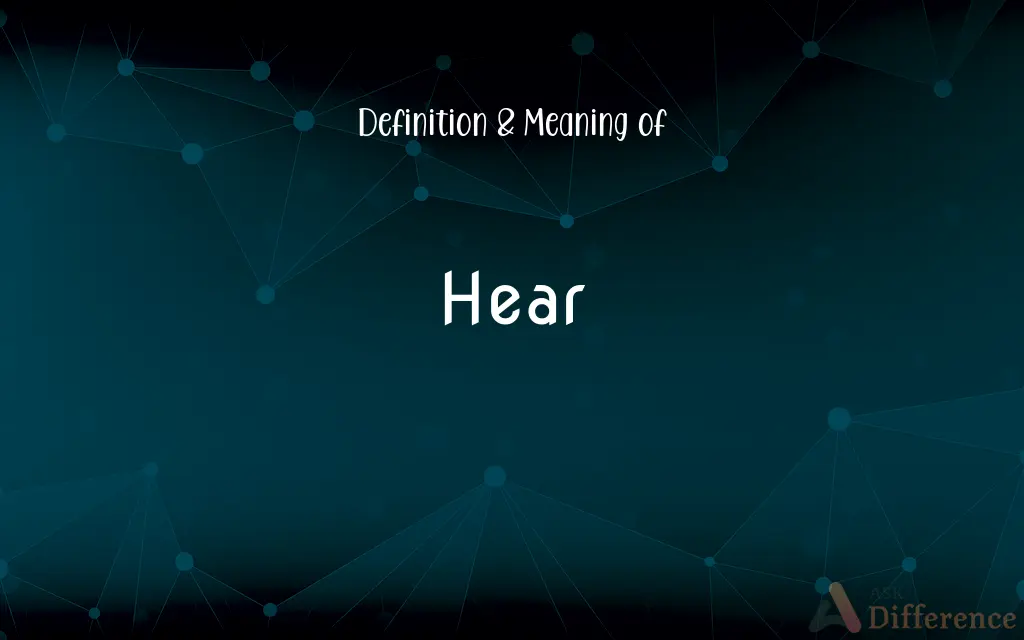Hear Definition and Meaning
By Tayyaba Rehman & Urooj Arif — Updated on March 5, 2024
"Hear" means to perceive sound through the ear or to receive information through listening. e.g., She could hear the distant sound of the train whistle.

Table of Contents
Hear Definitions
Hear means to perceive sounds with one's ears.
He could hear the birds chirping outside.
Hear signifies being informed or told about something.
They heard the news about the school trip.
Hear implies receiving auditory signals or messages.
He heard a strange noise in the night.
Hear suggests being aurally present at an event.
They heard the entire concert from their balcony.
To perceive (sound) by the ear
Can you hear the signal?.
To learn by hearing; be told by others
I heard she got married.
To listen to (something) attentively or in an official capacity, as in a court
Heard the last witness in the afternoon.
To listen to and consider favorably
Lord, hear my prayer!.
To attend or participate in
Hear Mass.
To be capable of perceiving sound.
To receive news or information; learn
I heard about your accident.
To consider, permit, or consent to something. Used only in the negative
I won't hear of your going!.
To perceive sounds through the ear.
I was deaf, and now I can hear.
To perceive (a sound, or something producing a sound) with the ear, to recognize (something) in an auditory way.
I heard a sound from outside the window.
(transitive) To exercise this faculty intentionally; to listen to.
(transitive) To listen favourably to; to grant (a request etc.).
Eventually the king chose to hear her entreaties.
(transitive) To receive information about; to come to learn of.
(with from) To be contacted by.
To listen to (a person, case) in a court of law; to try.
Your case will be heard at the end of the month.
To sympathize with; to understand the feelings or opinion of.
You're tired of all the ads on TV? I hear ya.
To study under.
You hear me
To perceive by the ear; to apprehend or take cognizance of by the ear; as, to hear sounds; to hear a voice; to hear one call.
Lay thine ear close to the ground, and list if thou canst hear the tread of travelers.
He had been heard to utter an ominous growl.
To give audience or attention to; to listen to; to heed; to accept the doctrines or advice of; to obey; to examine; to try in a judicial court; as, to hear a recitation; to hear a class; the case will be heard to-morrow.
To attend, or be present at, as hearer or worshiper; as, to hear a concert; to hear Mass.
To give attention to as a teacher or judge.
Thy matters are good and right, but there is no man deputed of the king to hear thee.
I beseech your honor to hear me one single word.
To accede to the demand or wishes of; to listen to and answer favorably; to favor.
I love the Lord, because he hath heard my voice.
They think that they shall be heard for their much speaking.
To have the sense or faculty of perceiving sound.
To use the power of perceiving sound; to perceive or apprehend by the ear; to attend; to listen.
So spake our mother Eve, and Adam heard,Well pleased, but answered not.
To be informed by oral communication; to be told; to receive information by report or by letter.
I have heard, sir, of such a man.
I must hear from thee every day in the hour.
Hear him, . . . a cry indicative, according to the tone, of admiration, acquiescence, indignation, or derision.
Perceive (sound) via the auditory sense
Get to know or become aware of, usually accidentally;
I learned that she has two grown-up children
I see that you have been promoted
Examine or hear (evidence or a case) by judicial process;
The jury had heard all the evidence
The case will be tried in California
Receive a communication from someone;
We heard nothing from our son for five years
Listen and pay attention;
Listen to your father
We must hear the expert before we make a decision
Hear refers to the act of listening to something.
She heard her favorite song on the radio.
Hear denotes attending to someone speaking.
The teacher asked if the students could hear her clearly.
Hear means becoming aware of sound.
She woke up when she heard the alarm clock.
Hear conveys understanding or comprehending spoken words.
He heard the instructions but didn't understand them.
Hear indicates experiencing or undergoing the sensation of sound.
The hiker heard the waterfall before seeing it.
Hear refers to the ability to perceive sound.
She was excited to hear the new language she was learning.
Hear Snonyms
Perceive
To become aware of something through the senses, especially by hearing.
He could perceive the faint sound of music from across the street.
Discern
To recognize or distinguish (a sound) with the ears.
With practice, he could discern the song of different birds.
Detect
To discover or identify the presence of a sound.
The detective detected the sound of footsteps in the dark alley.
Listen
To make an effort to hear something; to pay attention to sounds.
She listens to her favorite music before going to bed.
Catch
To receive or become aware of a sound unintentionally.
He caught the tail-end of their conversation as he entered the room.
Eavesdrop
To listen secretly to the private conversation of others.
They caught him eavesdropping behind the door.
Heed
To pay attention to; take notice of sound advice or warning.
Heed the safety instructions given by the flight attendant.
Attend
To pay attention to sound or speech.
She attends to the lecture carefully to not miss any important points.
Overhear
To hear (something) accidentally, not being the intended recipient.
She overheard her colleagues talking about her promotion.
Receive
To be given or presented with sound or information.
She received the news over the radio with mixed emotions.
Hear Idioms & Phrases
Hear it on the grapevine
To learn of something informally and unofficially by means of gossip or rumor.
I heard it on the grapevine that the company might be merging.
Hear a pin drop
An extremely quiet or silent situation.
The room was so silent during the announcement, you could hear a pin drop.
Hear the end of it
To continue to be reminded of something, especially a mistake or misdeed.
If I don't go to the wedding, I'll never hear the end of it from my family.
Hear the call
To perceive and respond to a need or a duty.
She heard the call to help others and volunteered at the shelter.
Haven't heard a peep
Not receiving any information, news, or communication from someone or about something.
I haven't heard a peep from them since they moved abroad.
Hear me out
A request to someone to listen to the speaker's argument or opinion until the end.
Please, just hear me out before you make any decision.
Hear tell
To be informed about something; to learn of something.
I've heard tell that the old theater is being renovated.
Hear from the horse's mouth
To get information from the most reliable source or directly from the person involved.
I got the news straight from the horse's mouth, so it has to be true.
Make oneself heard
To express oneself clearly and loudly enough to ensure one is understood.
In the noisy meeting, she struggled to make herself heard.
Not hear of it
To refuse to permit something.
He wanted to pay for dinner, but she would not hear of it.
Hear the last of
To stop receiving information or updates about something.
Finally, we've heard the last of those endless complaints.
Hear a different tune
To notice a change in someone's opinion, attitude, or stance.
Once he saw the evidence, he started singing a different tune.
Never hear the end of it
To be continually reminded or nagged about something.
If we lose this game, we'll never hear the end of it from our rivals.
Let me hear
Asking someone to inform or tell the speaker about something.
Let me hear your thoughts on the new project.
Hear Example Sentences
She strained to hear the whispering voices.
Can you hear the wind howling tonight?
They could hear the laughter coming from the other room.
They waited quietly to hear the announcement.
She could hear the echo of her footsteps in the hallway.
She couldn't hear the teacher because of the noise.
He was excited to hear his name called out.
I could hear the rain tapping against the window.
She loved to hear stories from her grandmother.
He heard the dog barking loudly next door.
Can you hear the birds singing in the morning?
He could hear the sound of the waves from his room.
She was so happy to hear her friend's voice on the phone.
They heard the bell ring and rushed to class.
He jumped when he heard the sudden bang.
Common Curiosities
How many syllables are in hear?
There is 1 syllable in "hear."
What is a stressed syllable in hear?
In the word "hear," the single syllable "hear" is stressed.
How do we divide hear into syllables?
Hear is not divided into syllables as it is a single syllable word.
How is hear used in a sentence?
Hear is used as a verb, e.g., "I can hear the music playing in the background."
What is the verb form of hear?
Hear itself is the base form of the verb.
What is the root word of hear?
The root word of hear is the Old English "hieran."
What is the second form of hear?
The second form is "heard" (past tense).
What is the third form of hear?
The third form is "heard" (past participle).
Why is it called hear?
It is called hear from the Old English word "hieran," meaning to perceive sound, related to the ability to perceive sounds with the ears.
What is another term for hear?
Another term for hear is "listen to" or "perceive."
What is the pronunciation of hear?
Hear is pronounced as /hɪr/.
What is the plural form of hear?
Hear does not have a plural form; verbs do not have plural forms.
What is the singular form of hear?
Hear does not have a singular form as it is a verb, not a noun.
Is hear an abstract noun?
No, hear is not a noun; it is a verb.
Is the word hear imperative?
Hear can be used in the imperative form, e.g., "Hear what I'm saying."
Is the word “hear” a Direct object or an Indirect object?
"Hear" is a verb and can act upon a direct object, e.g., "She hears the music."
Which vowel is used before hear?
Vowels are not typically used before verbs like hear.
What is the first form of hear?
The first form is "hear" (present tense).
Is hear a negative or positive word?
Hear is neutral; it can be either negative or positive depending on the context.
Is hear a vowel or consonant?
The word "hear" starts with a consonant.
Is hear a countable noun?
Hear is not a noun; it is a verb and therefore not countable.
Is the word hear Gerund?
The gerund form of hear is "hearing."
Which article is used with hear?
Articles are typically not used directly with verbs like "hear."
What is the opposite of hear?
The opposite of hear could be "ignore" or "disregard."
Is hear a collective noun?
No, hear is not a collective noun; it's a verb.
Which determiner is used with hear?
As a verb, hear typically doesn't use determiners.
Which conjunction is used with hear?
Conjunctions are not specific to the word "hear" and depend on the sentence structure. Examples include "and," "but," or "or."
What part of speech is hear?
Hear is a verb.
Is hear a noun or adjective?
Hear is a verb, not a noun or adjective.
Is hear an adverb?
No, hear is not an adverb.
Is the hear term a metaphor?
The word "hear" itself is not a metaphor, but it can be used metaphorically depending on the context.
Which preposition is used with hear?
Prepositions used with "hear" vary based on context, like "hear from someone" or "hear about the news."
Share Your Discovery

Previous Term
Catchy Definition and Meaning
Next Term
Round Definition and MeaningAuthor Spotlight
Written by
Tayyaba RehmanTayyaba Rehman is a distinguished writer, currently serving as a primary contributor to askdifference.com. As a researcher in semantics and etymology, Tayyaba's passion for the complexity of languages and their distinctions has found a perfect home on the platform. Tayyaba delves into the intricacies of language, distinguishing between commonly confused words and phrases, thereby providing clarity for readers worldwide.
Co-written by
Urooj ArifUrooj is a skilled content writer at Ask Difference, known for her exceptional ability to simplify complex topics into engaging and informative content. With a passion for research and a flair for clear, concise writing, she consistently delivers articles that resonate with our diverse audience.
































